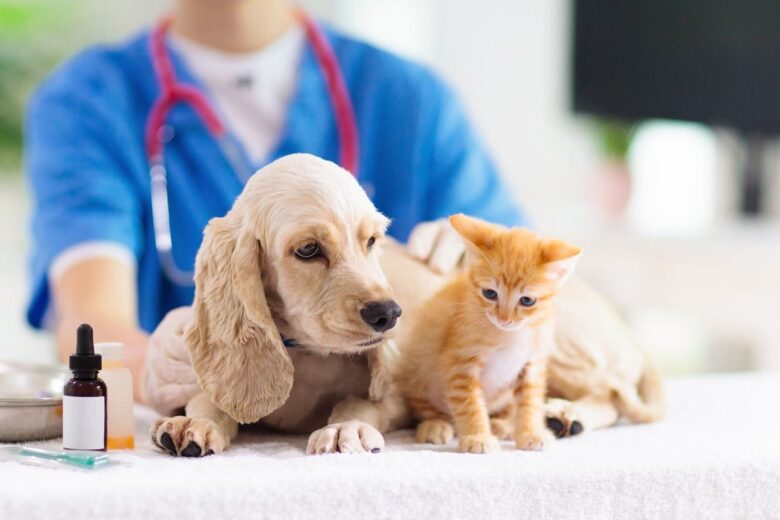With any pet, avoiding specific risks is much easier than dealing with a full-blown problem later on. That is why Vet Today specializes in pet vaccinations. They make sure that both dogs and cats are covered with the right vaccinations; no more, no less. Aside from optional vaccines that depend on certain lifestyle factors and a vaccine checklist based on location, pet owners are guided on what is a must and what is a no-go. A thorough understanding is pivotal is keeping your pet healthy and safe.
Importance of Vet Today Vaccinations for your pet
Vet Today vaccinations are simple to use and help protect your pet from life-threatening risks. Vaccinations are important for armoring up your pet’s immune so that they can be able to tell to harmful bacteria and viruses.
Vaccination is very important for dogs and cats. Vaccination is important for visiting other places, and your pet is fully covered with the right immunizations and won’t be able to get infections. FNT vaccines are very important for every pet and are given in combination with other vaccines.
The Difference Between Core and Non-Core Vaccines
Different pets have different vaccine needs. Most vets place vaccines into two categories:
Core Vaccines
These are available for all pets and are necessary for their health. No matter what the pet’s surroundings are or what activities the pet engages in, the core vaccine protects the pet from the most common and dangerous ailments.
- For Dogs: Distemper, parvovirus, adenovirus, and rabies.
- For Cats: Rabies, feline herpesvirus, calicivirus, and panleukopenia.
Non-Core Vaccines
These vaccines are recommended based on where the pet lives, their lifestyle, travel, and other activities. For instance:
- The Bordetella vaccine is recommended for dogs that go to boarding facilities or dog parks frequently due to high exposure to the disease.
- Outdoor kitties need the feline leukemia virus (FeLV) vaccine for extra precaution against the disease.
With core and non-core vaccines, pet owners can ensure that their pets are not over-vaccinated or under-vaccinated.
Timing Matters: Puppy and Kitten Vaccination Schedules
Children, maybe the youngest of pets, are the most prone to ailments. Hence, initiating the vaccine process is important.
For Puppies
- 6-8 Weeks: First core vaccine.
- 3-4 weeks: Booster shots until 16 weeks.
- 1 Year: Boosters at 1-year threshold.
For Kittens
- 6-8 Weeks: First core feline vaccine.
- Every 3–4 Weeks: Follow-up doses until they are 16 weeks old.
- 1 Year: Long-term protective boosters are administered.
Along with your veterinarian, keeping track of these timelines helps your pet develop proper immunity during their early stages.
Vaccinations for Adult Pets: Important Information
Following the puppy or kitten series, periodic booster shots will be needed for the dog or cat to sustain immunity. Most adult pets will receive annual or triennial boosters as dictated by the vaccine type and your veterinarian’s recommendations.
Boosters will be tailored according to the pet’s age, health, and lifestyle. Regular checkups are an excellent chance to talk about your pet’s vaccination history and roll up revisions if required.
Rabies Vaccination: Cannot be Negotiated
It’s one of the deadliest and worrisome diseases. Rabies vaccination is a legal obligation for dogs and cats in numerous jurisdictions. Even if the pet is entirely indoors, there is a chance that bats or some other wild animal could wander into the house.
Taking the rabies vaccine along with other vaccines is a simple yet very important measure in safeguarding the pet, the family, and the entire neighborhood.
Recommendations for Vaccines Based on Lifestyle
Your pet’s daily activities and environments play a large role in deciding which non-core vaccines are relevant.
- Active Dogs: Going to dog parks, groomers, or daycare? Vaccines for Bordetella, canine influenza, or leptospirosis could be indicated.
- Traveling Pets: Pets that travel across states and countries might be at risk for certain diseases and may need extra vaccines.
- Outdoor Cats: Cats that are allowed to roam outside are at a greater risk of exposure and may be eligible for vaccines such as FeLV.
Your veterinarian can help you develop a strategy that addresses your pet’s unique lifestyle with a tailored vaccine schedule.
Addressing The Risks and Myths of Vaccinating Pets
Mild side effects of vaccinations, like feeling a bit tired or a small bump where the shot was given, are normal and can resolve on their own. More serious reactions, which are very uncommon, can be treated by a veterinarian.
There are so many myths out there, like “indoor pets don’t need vaccines” and “vaccines make pets sick.” These are not true, and it’s become clear over the years that pets of all kinds need to be vaccinated and researched to be in the best health.
Preparation Tips for a Vaccination Appointment
Preparation is essential for any task. Take a look at the approaches below to structure the appointment around the pet’s requirements.
- Take note of the pet’s health documentation to ensure file accuracy.
- Plan for a calm environment both prior to and after the appointment.
- Use praise and treats to reward good behavior during the appointment.
- Schedule appointments during non-busy hours to reduce anxiety.
Taking these steps is especially beneficial for anxious pets.
Follow-up Care after Vaccination: Anticipate
Pets are like children and require special attention, especially after a long day. Pets tend to become tired and sore, such like a child. Having a comfortable area with their favorite meals is essential for good recovery.
Veterinary attention is critical for unusual symptoms such as vomiting, breathing issues, or face swelling. These symptoms are worrisome, especially for children.
Maintain Accuracy
Your pet may only travel with you once for grooming. Without proper documentation, you may be denied boarding. Pets also require special documentation for travel and health records, which is crucial.
With the advancement of technology, many clinics and veterinarians are able to provide electronic records, making documentation much easier.
A good record helps ensure punctuality for receiving dose boosters while also avoiding unnecessary repeat vaccinations.
The Role Of Preventive Care
Vaccination is just one aspect of a comprehensive preventive care plan. Checkups, parasite control, dental work, good nutrition, and other factors also help your pet.
Preventive care also allows for the early identification of issues, thereby reducing the complexity and cost of management and treatment for a longer and healthier life.
Choosing The Right Veterinarian
Your choice of a veterinarian can greatly impact your pet’s care. Check for clinics that:
- Explain every vaccine and why it is recommended.
- Have convenient scheduling and booster shot reminders.
- Have calm and welcoming environments for pets and pet owners.
With a reliable veterinary partner, you can eliminate guesswork from your pet’s vaccination timetable and their health management.
Cost Considerations
Vaccines are a routine cost for the practice, but are a fraction of the cost of the disease treatment. Many clinics have wellness packages or yearly plans that bundle vaccines and other preventive services, which help manage your costs while also keeping your pet well.
Taking the time to care for potential health issues will add a lot of wasted time, stress, and money costs if neglected later on.
Keeping Up With the New Guidelines and Recommendations
Just like any field of medicine, veterinary medicine has its vaccines that are updated from time to time, and so does the history of vaccinations your pet has received. Keeping track ensures your veterinary medicine gets the appropriate updates for the vaccinations. Your vet remains the most appropriate person to inform you of any changes and options that may be made to the vaccination schedule of your pet.
Concluding thoughts
It doesn’t have to be difficult to comprehend the vaccination of pets. With a good understanding of the core concepts, keeping appointments, and a reliable vet, you can provide the required care for your cat or dog to be healthy and safe.
To learn more about your pet’s health, schedules, and appropriate care in your surrounding locations, visit Vet Today. They offer materials for you to aid in decision-making and help your pets thrive for a long time. For reliable advice, trust the professionals of Veterinarian Today who can help you in every step of your pet’s health care journey.




